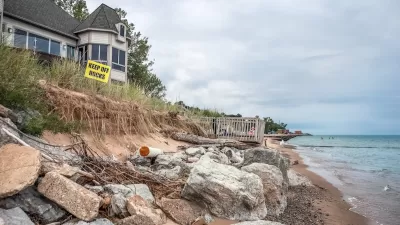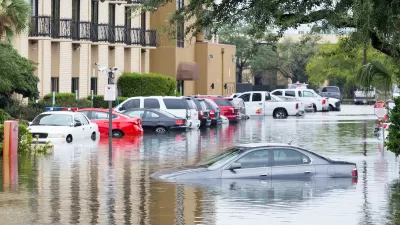Setting insurance rates by looking to the past to predict the future doesn’t make sense with increasing environmental uncertainties, argues the California insurance industry.

Ry Rivard reports that insurance companies in California are arguing that the "new normal" of climate change is altering the insurance landscape. "Near the top of the industry’s wish list is a wonky request: Let insurers set premiums based on the risk of fires that could burn someday soon."
The current approach is to use past losses to predict future ones. But many of the most catastrophic events have happened fairly recently and the frequency and severity of disasters will likely increase in the future. “Since the 1980s, insurers have used increasingly sophisticated computer models to prepare for hurricanes and earthquakes. The California Earthquake Authority, a government-run insurer, uses catastrophe models to set rates, as does a similar effort in Florida to provide hurricane insurance,” writes Rivard.
Critics say that allowing insurers to set rates based on catastrophe models would limit transparency, and they contend that the models do not accurately predict future risks, notes Rivard. "Regulators worry the models aren’t credible, and that they’re a 'black box' and could be used to overcharge consumers."
FULL STORY: Insurance Companies Say They're Not Allowed to Plan for the ‘New Normal’ of Intense Wildfires

Planetizen Federal Action Tracker
A weekly monitor of how Trump’s orders and actions are impacting planners and planning in America.

San Francisco's School District Spent $105M To Build Affordable Housing for Teachers — And That's Just the Beginning
SFUSD joins a growing list of school districts using their land holdings to address housing affordability challenges faced by their own employees.

The Tiny, Adorable $7,000 Car Turning Japan Onto EVs
The single seat Mibot charges from a regular plug as quickly as an iPad, and is about half the price of an average EV.

As Trump Phases Out FEMA, Is It Time to Flee the Floodplains?
With less federal funding available for disaster relief efforts, the need to relocate at-risk communities is more urgent than ever.

With Protected Lanes, 460% More People Commute by Bike
For those needing more ammo, more data proving what we already knew is here.

In More Metros Than You’d Think, Suburbs are Now More Expensive Than the City
If you're moving to the burbs to save on square footage, data shows you should think again.
Urban Design for Planners 1: Software Tools
This six-course series explores essential urban design concepts using open source software and equips planners with the tools they need to participate fully in the urban design process.
Planning for Universal Design
Learn the tools for implementing Universal Design in planning regulations.
Smith Gee Studio
City of Charlotte
City of Camden Redevelopment Agency
City of Astoria
Transportation Research & Education Center (TREC) at Portland State University
US High Speed Rail Association
City of Camden Redevelopment Agency
Municipality of Princeton (NJ)





























